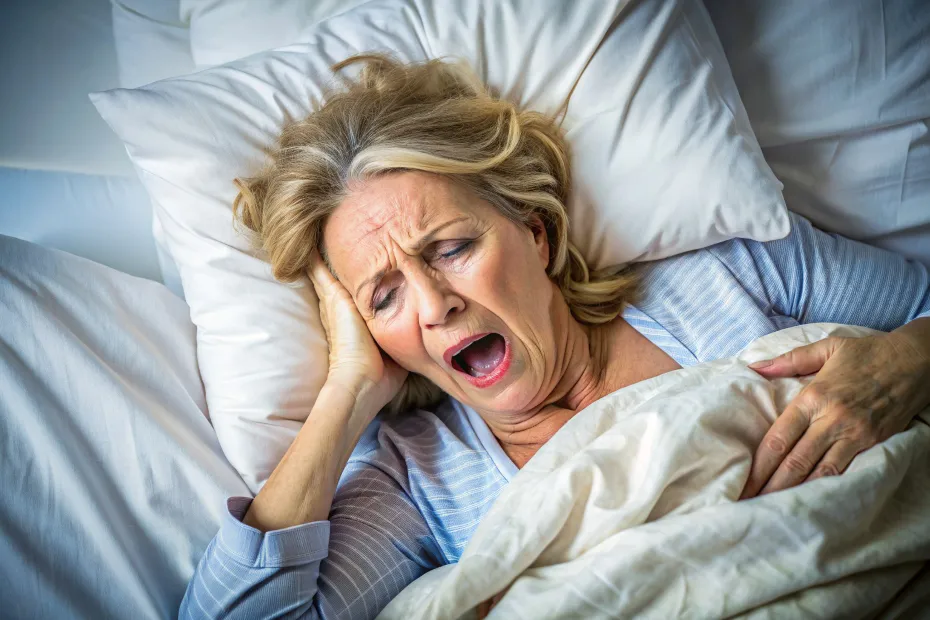Menopause is a significant life transition that brings various changes, including disruptions to sleep patterns. Many women find themselves struggling with insomnia, night sweats, and other sleep-related issues during this time. This comprehensive guide explores effective techniques for managing sleep disruptions during menopause, helping you reclaim restful nights and energized days.
Understanding Sleep Disruptions in Menopause
Before diving into solutions, it’s crucial to understand why sleep disruptions occur during menopause. Hormonal changes, particularly the decline in estrogen and progesterone, can affect sleep quality and quantity. These hormonal shifts can lead to:
- Difficulty falling asleep
- Frequent night awakenings
- Hot flashes and night sweats
- Mood changes affecting sleep
According to the National Sleep Foundation, up to 61% of postmenopausal women report insomnia symptoms. Let’s explore various techniques to address these challenges and improve your sleep quality.
Lifestyle Modifications to Improve Sleep During Menopause
Making certain lifestyle changes can significantly impact your sleep quality during menopause. Here are some effective strategies:
Establish a Consistent Sleep Schedule
Maintaining a regular sleep-wake cycle helps regulate your body’s internal clock. Try to:
- Go to bed and wake up at the same time every day, even on weekends
- Create a relaxing bedtime routine to signal your body it’s time to sleep
- Avoid naps late in the day, as they can interfere with nighttime sleep
Optimize Your Sleep Environment
Creating a sleep-friendly bedroom can help minimize disruptions:
- Keep your bedroom cool, dark, and quiet
- Use breathable, moisture-wicking bedding to manage night sweats
- Invest in a supportive mattress and pillows
Exercise Regularly, But Time It Right
Physical activity can improve sleep quality, but timing is crucial:
- Aim for at least 30 minutes of moderate exercise most days
- Avoid vigorous exercise close to bedtime, as it can be stimulating
- Consider gentle yoga or stretching in the evening to promote relaxation
Dietary Approaches to Manage Sleep Disruptions During Menopause
What you eat and drink can significantly impact your sleep. Here are some dietary strategies to consider:
Limit Caffeine and Alcohol Intake
Both caffeine and alcohol can interfere with sleep:
- Avoid caffeine in the afternoon and evening
- Limit alcohol consumption, especially close to bedtime
Choose Sleep-Promoting Foods
Certain foods can support better sleep:
- Include foods rich in tryptophan, such as turkey, milk, and nuts
- Opt for complex carbohydrates like whole grains, which can help you fall asleep faster
Stay Hydrated, But Time Your Fluid Intake
Proper hydration is important, but frequent nighttime bathroom trips can disrupt sleep:
- Drink plenty of water throughout the day
- Reduce fluid intake in the evening to minimize nighttime awakenings

Stress Management Techniques for Better Sleep
Stress and anxiety can exacerbate sleep disruptions during menopause. Implementing stress management techniques can help:
Practice Relaxation Techniques
Various relaxation methods can prepare your mind and body for sleep:
- Try deep breathing exercises or progressive muscle relaxation
- Explore meditation or mindfulness practices
Cognitive Behavioral Therapy for Insomnia (CBT-I)
CBT-I is a structured program that helps identify and replace thoughts and behaviors that cause or worsen sleep problems. It has been shown to be effective in managing menopausal sleep disruptions.
Hormone Therapy and Sleep Disruptions During Menopause
For some women, hormone therapy may be an option to manage menopausal symptoms, including sleep disruptions:
Exploring Hormone Replacement Therapy (HRT)
HRT can help alleviate various menopausal symptoms:
- Discuss the potential benefits and risks with your healthcare provider
- Consider factors such as your age, health history, and symptom severity
Non-Hormonal Medications
In some cases, non-hormonal medications may be prescribed to address specific sleep issues:
- Low-dose antidepressants might help with hot flashes and mood changes
- Sleep aids may be recommended for short-term use in some situations
Always consult with a healthcare professional before starting any new medication regimen.
Natural Remedies and Supplements
Some women find relief from sleep disruptions through natural remedies:
Herbal Supplements
Certain herbs may help with sleep and menopausal symptoms:
- Valerian root has been studied for its potential sleep-promoting effects
- Black cohosh might help with hot flashes, potentially improving sleep
Melatonin Supplementation
Melatonin, a hormone that regulates sleep-wake cycles, may be beneficial:
- Some studies suggest melatonin can improve sleep quality in menopausal women
- Consult with a healthcare provider about appropriate dosage and timing
Remember to discuss any supplements with your doctor, as they can interact with medications or have side effects.
When to Seek Professional Help
While many sleep disruptions during menopause can be managed with lifestyle changes and home remedies, sometimes professional help is needed:
Consult a Sleep Specialist
If sleep problems persist despite trying various techniques, consider seeing a sleep specialist:
- They can conduct a thorough evaluation of your sleep patterns
- Specialized treatments like light therapy might be recommended
Talk to Your Gynecologist
Your gynecologist can provide valuable insights and treatment options:
- They can assess whether your sleep issues are related to other menopausal symptoms
- They may recommend specialized treatments or refer you to other specialists if needed
Conclusion: Embracing Better Sleep During Menopause
Dealing with sleep disruptions during menopause can be challenging, but there are numerous effective techniques to improve your sleep quality. From lifestyle modifications and dietary changes to stress management and medical interventions, the key is finding the right combination of strategies that work for you.
Remember that everyone’s experience with menopause is unique, and what works for one person may not work for another. Be patient with yourself as you explore different techniques, and don’t hesitate to seek professional help if needed. With persistence and the right approach, you can navigate through this transition and reclaim restful, rejuvenating sleep.
By implementing these strategies and working closely with healthcare professionals, you can effectively manage sleep disruptions during menopause and improve your overall quality of life. Sweet dreams await!
FAQs About Sleep Disruptions During Menopause
1. How long do sleep problems typically last during menopause?
Sleep disruptions can vary in duration for each woman. They often begin during perimenopause and may continue into postmenopause. While some women experience sleep issues for a few months, others may have symptoms that persist for several years. The duration can depend on individual factors such as overall health, lifestyle, and how well symptoms are managed.
2. Can certain foods trigger night sweats and sleep disruptions?
Yes, some foods can potentially trigger or worsen night sweats and sleep disruptions during menopause. Common triggers include:
- Spicy foods
- Caffeine
- Alcohol
- Sugar
- Hot drinks
It’s advisable to keep a food diary to identify personal triggers and avoid consuming these items, especially close to bedtime.
3. Is it safe to take over-the-counter sleep aids during menopause?
While over-the-counter sleep aids may provide temporary relief, they’re not recommended for long-term use without medical supervision. These medications can have side effects and may interact with other drugs. It’s best to consult with a healthcare provider before starting any sleep medication, even those available over the counter. They can help determine if these aids are appropriate for your situation and guide you on safe usage.
4. Can exercise really help with menopausal sleep problems?
Yes, regular exercise can significantly improve sleep quality during menopause. Physical activity helps regulate body temperature, reduce stress, and promote better sleep. However, timing is crucial. Exercising too close to bedtime can be stimulating and interfere with sleep. Aim to finish moderate to vigorous exercise at least 3 hours before bedtime. Gentle exercises like yoga or stretching can be beneficial even closer to bedtime.
5. Are there any new treatments or technologies for managing sleep disruptions during menopause?
Research into menopausal symptoms, including sleep disruptions, is ongoing. Some newer approaches include:
- Cognitive Behavioral Therapy for Insomnia (CBT-I) apps and online programs
- Temperature-regulating mattresses and pillows
- Light therapy devices to help regulate circadian rhythms
- Wearable devices that track sleep patterns and provide personalized recommendations
While these technologies show promise, it’s important to discuss their use with a healthcare provider to ensure they’re appropriate for your individual needs.
Remember, these FAQs provide general information. For personalized advice, always consult with a healthcare professional who can take into account your specific health history and circumstances.

